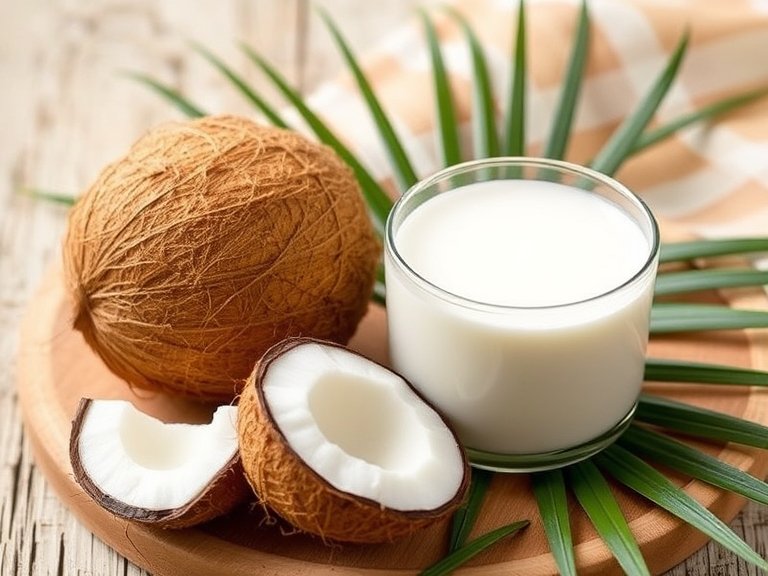What is Fresh Coconut Milk?
Fresh coconut milk is a creamy, white liquid extracted from the grated pulp of mature coconuts. It differs from coconut water, which is the clear liquid found inside young coconuts. The milk has a rich, smooth texture and carries a natural sweetness with a subtle coconut flavor.
Traditional Extraction Process
The traditional method of making fresh coconut milk involves grating the white flesh of mature coconuts and squeezing it through cheesecloth with warm water. This process yields two types of milk: thick first-press milk and thinner second-press milk. First-press milk contains more coconut cream and has a richer taste.
Nutritional Profile of Fresh Coconut Milk
Fresh coconut milk is packed with essential nutrients that contribute to overall health. It contains healthy fats, particularly medium-chain triglycerides (MCTs), which are easily digestible and provide quick energy. The milk is also rich in minerals like manganese, copper, phosphorus, magnesium, and iron.
Health Benefits of Fresh Coconut Milk
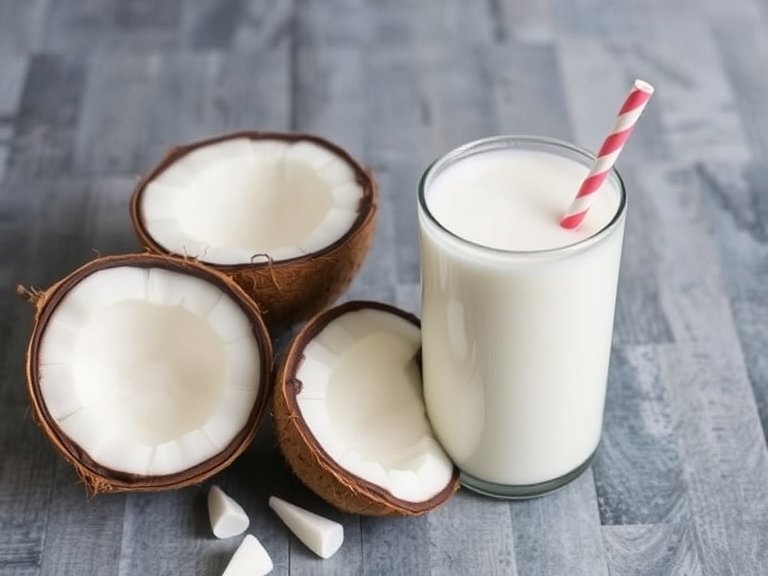
Supports Heart Health
The lauric acid in coconut milk helps maintain healthy cholesterol levels when consumed as part of a balanced diet. This fatty acid may help reduce inflammation and support cardiovascular function. Regular consumption in moderation can contribute to better heart health.
Boosts Immune System
Fresh coconut milk contains antimicrobial compounds that help strengthen the immune system. The lauric acid converts to monolaurin in the body, which has antiviral and antibacterial properties. This helps protect against various infections and supports overall immunity.
Promotes Healthy Skin and Hair
The natural fats and vitamins in coconut milk nourish the skin from within. When consumed regularly, it can help maintain skin elasticity and prevent dryness. The milk’s nutrients also support healthy hair growth and can improve hair texture when used both internally and externally.
Weight Management Benefits
Despite its rich calorie content, coconut milk can aid in weight management. The MCTs present in the milk boost metabolism and provide a feeling of fullness, which may help reduce overall calorie intake. These fats are less likely to be stored as body fat compared to other dietary fats.
Digestive Health Advantages
Fresh coconut milk is naturally soothing to the digestive system. Its anti-inflammatory properties can help reduce gut inflammation and support healthy digestion. The milk’s fiber content aids in maintaining regular bowel movements and promotes gut health.
Energy Boost Properties
The MCTs in coconut milk provide quick energy to the body and brain. Unlike other fats, these are rapidly absorbed and converted into energy, making coconut milk an excellent natural energy booster. This makes it particularly beneficial for athletes and active individuals.
Cooking with Fresh Coconut Milk
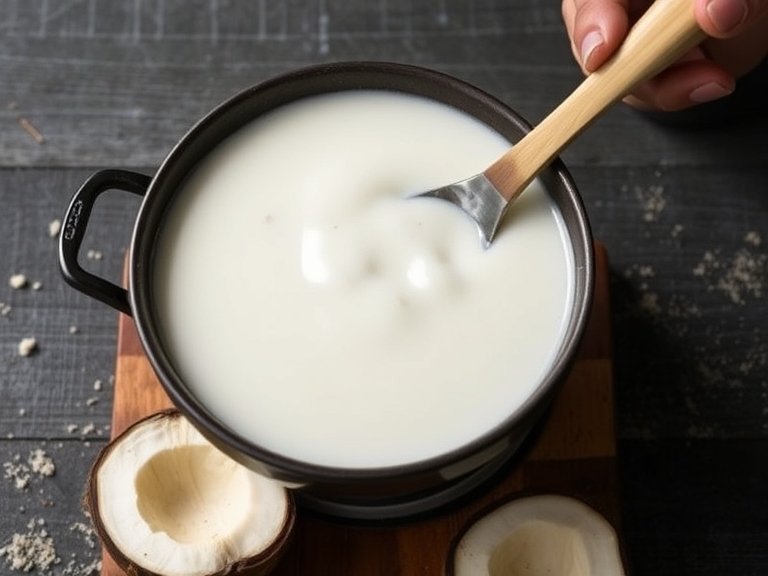
Culinary Applications
Fresh coconut milk adds richness and depth to various dishes. It’s commonly used in:
- Curries and soups
- Smoothies and beverages
- Desserts and baked goods
- Breakfast cereals and porridge
- Sauce bases for various cuisines
Storage and Preservation
Proper storage is crucial for maintaining the freshness of coconut milk. It can be refrigerated for up to 4-5 days in an airtight container. For longer storage, it can be frozen in ice cube trays or freezer-safe containers for up to 3 months.
Coconut Milk in Different Cuisines
Asian Cuisine
In Asian cooking, fresh coconut milk is a staple ingredient. It forms the base of many Thai curries, Indonesian rendang, and Malaysian laksa. The milk adds creaminess and authentic flavor to these traditional dishes.
Caribbean Dishes
Caribbean cuisine uses coconut milk extensively in both savory and sweet dishes. It’s essential in making rice and peas, various stews, and traditional desserts like coconut tarts and puddings.
Modern Fusion Cooking
Contemporary chefs are incorporating fresh coconut milk in innovative ways. It’s becoming popular in vegan dishes, modern desserts, and fusion cuisine, offering a dairy-free alternative with unique flavor profiles.
Sustainability and Environmental Impact
Coconut Farming
Sustainable coconut farming practices are essential for maintaining environmental balance. Many farmers are adopting organic methods and implementing water conservation techniques to ensure sustainable production.
Economic Impact
The coconut milk industry provides livelihood opportunities for many communities in tropical regions. Supporting sustainable coconut farming helps maintain economic stability in these areas.
Alternative Uses of Fresh Coconut Milk
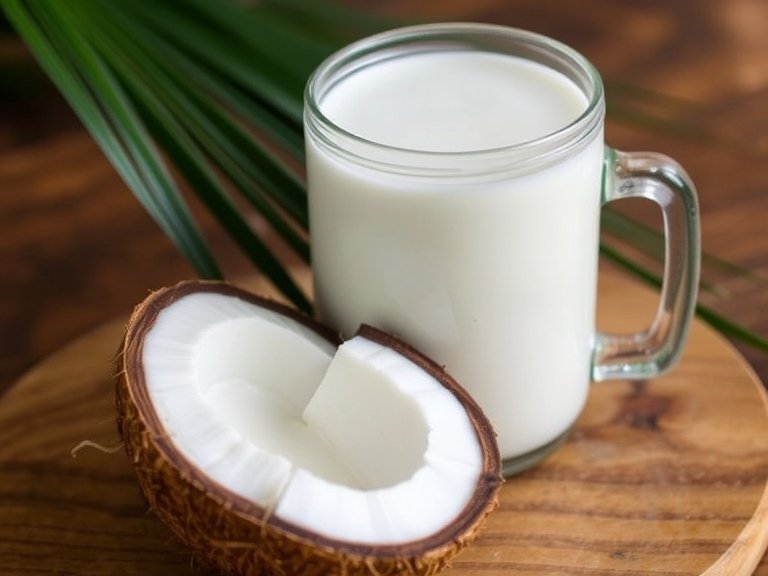
Beauty Applications
Fresh coconut milk can be used in various beauty treatments:
- Natural hair conditioner
- Face mask ingredient
- Body moisturizer
- Makeup remover
- Bath soak additive
Household Uses
Beyond cooking and beauty, coconut milk finds applications in:
- Natural fabric softener
- Plant fertilizer
- Pet food supplement
- Natural cleaning solution
- Aromatherapy base
Choosing Quality Fresh Coconut Milk
Selection Tips
When selecting fresh coconuts for milk extraction:
- Choose heavy coconuts with clear water sound
- Check for cracks or damage
- Avoid moldy or discolored shells
- Select mature coconuts for richer milk
- Consider organic options when available
Making Fresh Coconut Milk at Home
Basic Method
Creating fresh coconut milk at home is simple:
- Crack and remove coconut meat
- Grate the fresh meat
- Blend with warm water
- Strain through cheesecloth
- Store properly
Health Considerations
Allergies and Sensitivities
While coconut milk is generally safe, some people may have allergies or sensitivities. It’s important to start with small amounts when introducing it to your diet and consult healthcare providers if concerned.
Caloric Content
Fresh coconut milk is calorie-dense due to its high-fat content. While these fats are healthy, portion control is important for maintaining a balanced diet.
Coconut Milk vs. Other Plant-Based Milk
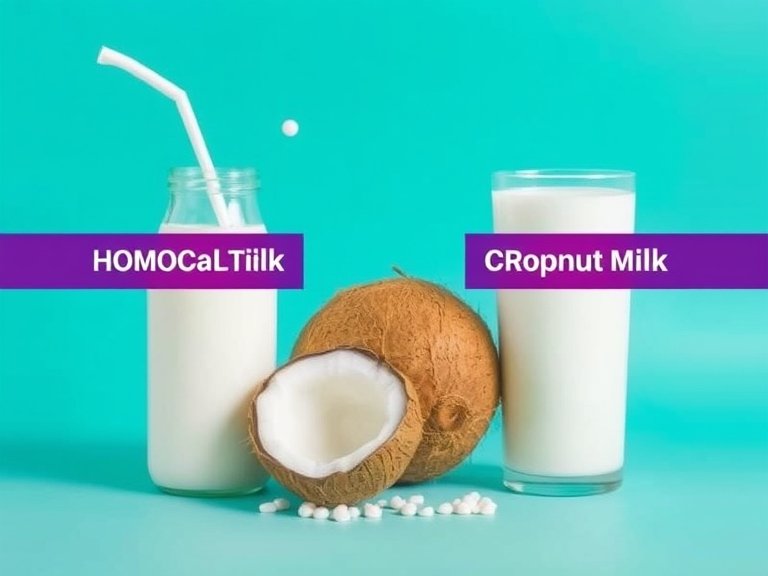
Nutritional Comparison
When compared to other plant-based milk alternatives:
- Higher in healthy fats
- Rich in minerals
- Contains no added sugars
- Natural creamy texture
- Unique flavor profile
Commercial vs. Fresh Coconut Milk
Quality Differences
Fresh coconut milk differs from commercial versions in several ways:
- No preservatives
- Better taste
- Higher nutrient content
- No additives
- More authentic flavor
Global Market Trends
Growing Demand
The global demand for coconut milk continues to rise due to:
- Increasing vegan population
- Health awareness
- Culinary diversity
- Alternative milk demand
- Traditional medicine interest
Research and Studies
Scientific Findings
Recent studies highlight various benefits:
- Anti-inflammatory properties
- Antimicrobial effects
- Metabolic benefits
- Skin health improvements
- Digestive advantages
Modern Applications
Contemporary Uses
Modern applications of fresh coconut milk include:
- Coffee creamer alternative
- Protein shake base
- Ice cream making
- Cocktail ingredient
- Baking substitute
Frequently Asked Questions
1. How long does fresh coconut milk last?
Fresh coconut milk typically lasts 4-5 days when refrigerated properly in an airtight container.
2. Can I freeze fresh coconut milk?
Yes, you can freeze fresh coconut milk for up to 3 months in freezer-safe containers.
3. Is coconut milk good for weight loss?
The MCTs in coconut milk can aid metabolism and provide satiety, potentially supporting weight management goals.
4. Can coconut milk replace dairy milk?
Yes, coconut milk can be used as a dairy alternative in most recipes, though the flavor and fat content will differ.
5. Is fresh coconut milk better than canned?
Fresh coconut milk generally contains more nutrients and no preservatives, making it a healthier choice than canned versions.
Conclusion
Fresh coconut milk stands as a versatile, nutrient-rich food that offers numerous health benefits and culinary applications.
From its traditional uses in Asian and Caribbean cuisines to modern applications in vegan cooking and beauty treatments, its versatility is remarkable.
The milk’s natural composition of healthy fats, minerals, and beneficial compounds makes it an excellent addition to a balanced diet.
Whether used for cooking, skincare, or health purposes, fresh coconut milk continues to gain popularity worldwide.
As research continues to uncover more benefits, its role in modern health and cuisine is likely to expand further.
When consumed as part of a balanced diet and lifestyle, fresh coconut milk can contribute significantly to overall health and well-being.
Understanding the proper selection, preparation, and storage of fresh coconut milk ensures maximum benefits and enjoyment of this natural product.
As consumer awareness grows about the importance of natural, unprocessed foods, fresh coconut milk remains a valuable option for those seeking healthy, versatile, and delicious alternatives to traditional dairy products.
Its sustainable production and numerous applications make it an environmentally conscious choice for the health-conscious consumer.

